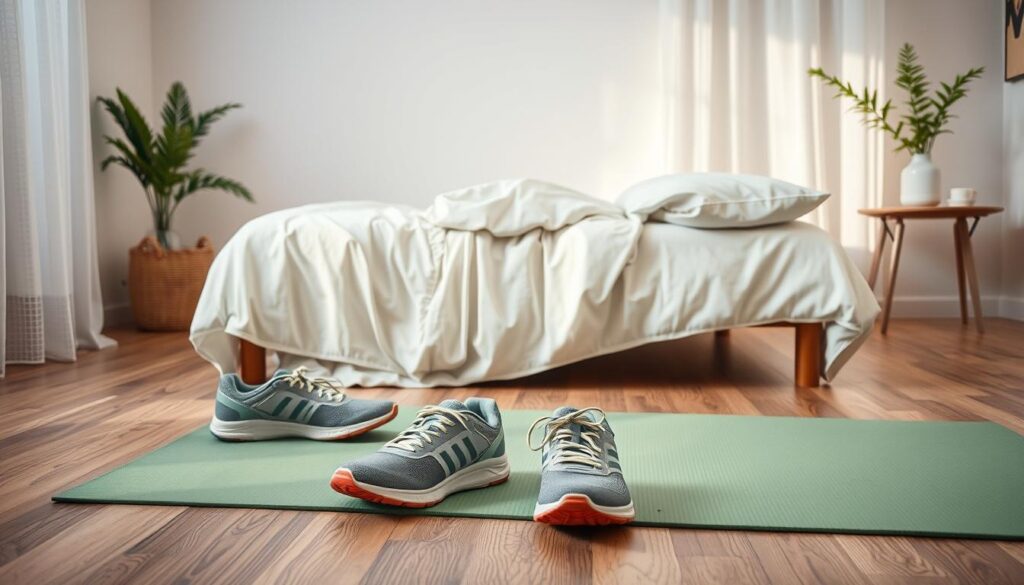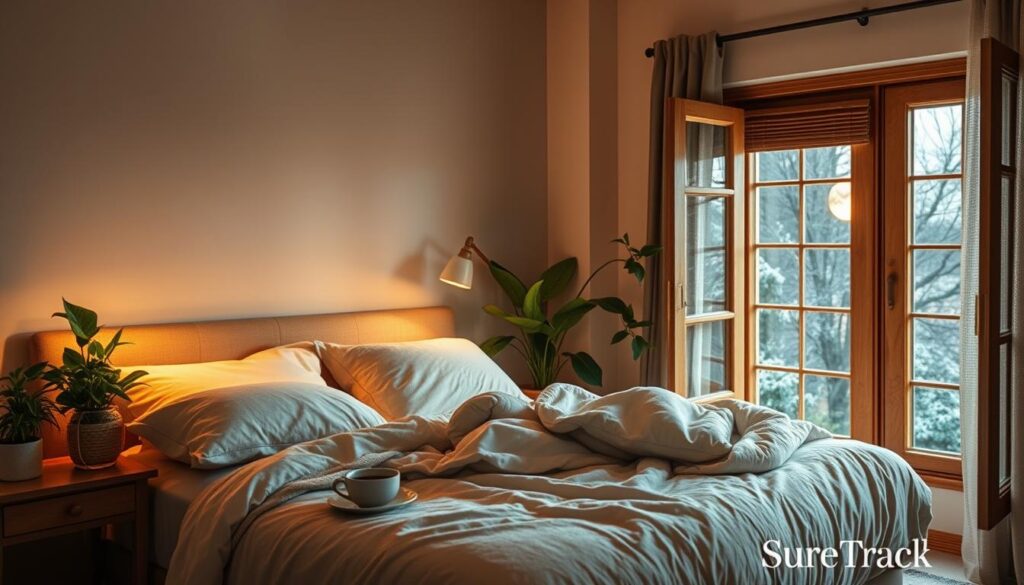In a world where sleep deprivation has become a widespread issue, more and more individuals are seeking natural ways to combat insomnia. This comprehensive guide will take you on a journey from exploring herbal remedies to establishing healthy sleep habits, empowering you to reclaim the restful nights you deserve. Whether you’re struggling with occasional sleeplessness or chronic insomnia, this article will provide you with a holistic approach to improving your sleep quality and overall well-being.
Key Takeaways
- Discover the root causes of insomnia and its psychological impact
- Learn about the effectiveness of various herbal remedies for better sleep
- Understand the importance of establishing a consistent sleep routine and creating a relaxing bedtime environment
- Explore the role of nutrition, physical activity, and mindfulness techniques in promoting quality sleep
- Recognize the influence of screen time and lifestyle factors on your sleep patterns
- Identify when it’s time to seek professional help for chronic sleep issues
- Empower yourself with a holistic approach to treating insomnia naturally
Understanding Insomnia: Causes and Effects
Insomnia, the persistent inability to fall asleep or stay asleep through the night, is a common sleep disorder that affects millions of individuals worldwide. To address this problem effectively, it is crucial to understand the underlying causes and the profound impact it can have on our physical and mental well-being.
Common Causes of Insomnia
Insomnia can be triggered by a variety of factors, both physical and psychological. Stress, anxiety, depression, and significant life events are among the primary culprits, as they can disrupt the body’s natural sleep-wake cycle. Additionally, poor sleep hygiene habits, such as irregular bedtime routines, excessive screen time before bed, and irregular sleep schedules, can contribute to the development of insomnia.
Psychological Impact of Sleep Deprivation
The consequences of chronic insomnia extend far beyond simply feeling tired. Prolonged sleep deprivation can have a profound impact on our mental health, leading to increased feelings of irritability, difficulty concentrating, and a heightened risk of developing depression and anxiety disorders. Sleep hygiene tips and how to treat insomnia naturally are crucial for maintaining overall well-being.
Addressing the underlying causes of insomnia and implementing effective strategies to improve sleep quality are essential steps in regaining control over one’s sleep patterns and overall health. By understanding the complexities of insomnia and its consequences, individuals can take proactive measures to achieve better, more restorative sleep, ultimately enhancing their quality of life.
| Factors Contributing to Insomnia | Psychological Impact of Sleep Deprivation |
|---|---|
|
|
“Insomnia is not just a nuisance; it can have a profound impact on our mental and physical health. Addressing the root causes and implementing effective natural remedies can help us regain control over our sleep patterns and overall well-being.”
The Role of Herbs in Promoting Sleep
As the world becomes increasingly fast-paced and stressful, more people are turning to natural remedies to address their sleep issues. The realm of herbal sleep aids and natural sleep supplements offers a promising solution for those seeking to improve their sleep quality and overall well-being.
Popular Herbal Remedies for Insomnia
Among the most well-known herbal sleep aids are chamomile, valerian root, and lavender. Chamomile is renowned for its calming properties, often used in teas or supplements to promote relaxation and ease the transition into sleep. Valerian root, on the other hand, has been studied for its ability to shorten the time it takes to fall asleep and improve sleep quality. Lavender, a fragrant herb, has been shown to have a soothing effect on the mind and body, aiding in the management of insomnia.
How to Use Herbs Effectively
- Consult with a healthcare professional before incorporating herbal sleep aids into your routine, as they can provide guidance on appropriate dosages and potential interactions with medications.
- Experiment with different herbs to find the ones that work best for your individual needs, as the effectiveness of natural sleep supplements can vary from person to person.
- Incorporate herbs into your daily routine, such as brewing a cup of chamomile tea or using lavender essential oil in a diffuser before bedtime.
Safety Considerations with Herbal Treatments
While herbal sleep aids are generally considered safer than pharmaceutical options, it’s essential to be mindful of potential side effects and interactions. Some herbs may interact with certain medications or have contraindications for individuals with specific health conditions. Always consult with a healthcare professional before starting any new herbal regimen, and be sure to follow dosage instructions carefully.

“The beauty of using herbs for sleep is that they work gently and naturally to promote relaxation and restful slumber.”
Establishing a Healthy Sleep Routine
Cultivating a consistent sleep schedule and creating a relaxing bedtime environment are essential components of effective sleep hygiene. Consistency in sleep patterns and a soothing pre-bedtime routine can significantly improve the quality and duration of your slumber.
Importance of Consistency in Sleep Schedule
Maintaining a regular sleep-wake cycle is crucial for regulating the body’s natural circadian rhythms. Going to bed and waking up at the same time each day, even on weekends, can help synchronize your internal clock and promote better sleep. Sticking to a consistent schedule can also reduce the time it takes to fall asleep and improve the overall quality of your rest.
Creating a Relaxing Bedtime Environment
The environment in which you sleep plays a vital role in the quality of your rest. Ensuring your bedroom is dark, cool, and quiet can create a conducive atmosphere for sleep. Incorporating relaxation techniques, such as gentle stretching or deep breathing exercises, can also help transition your body and mind into a state of restfulness.
To promote better sleep hygiene, consider implementing the following tips:
- Establish a consistent sleep schedule, going to bed and waking up at the same time each day.
- Avoid using electronic devices, such as smartphones or tablets, in the bedroom, as the blue light emitted can disrupt your body’s natural sleep-wake cycle.
- Ensure your bedroom is dark, cool, and quiet, creating an environment conducive to restful sleep.
- Engage in relaxing activities before bed, such as reading a book, taking a warm bath, or practicing gentle stretching or meditation.
- Avoid consuming caffeine, alcohol, or heavy meals close to bedtime, as these can interfere with your ability to fall and stay asleep.
By implementing these lifestyle changes for better sleep, you can establish a healthy sleep routine that promotes improved sleep quality and overall well-being.
Nutrition’s Role in Sleep Quality
When it comes to natural sleep remedies, the foods we consume play a crucial role in our sleep quality. Certain nutrients and compounds found in various food items can either promote or hinder our ability to fall and stay asleep. By understanding the relationship between nutrition and sleep, we can make informed lifestyle changes for better sleep.
Foods to Promote Sleep
- Tryptophan-rich foods, such as turkey, eggs, nuts, and seeds, can help boost serotonin and melatonin production, which are essential for regulating the sleep-wake cycle.
- Magnesium-rich foods, including leafy greens, whole grains, and bananas, can help relax the body and mind, aiding in better sleep.
- Chamomile tea and warm milk contain compounds that have a calming effect, making them beneficial for pre-bedtime rituals.
- Cherries and kiwi fruit are natural sources of melatonin, the hormone that controls our sleep-wake patterns.
Foods to Avoid Before Bed
While certain foods can promote sleep, others can disrupt it. Avoiding these foods, especially in the hours leading up to bedtime, can help improve natural sleep remedies and overall sleep quality.
- Caffeinated beverages, such as coffee, tea, and energy drinks, can stimulate the nervous system and make it harder to fall asleep.
- Spicy, heavy, or fried foods can cause digestive discomfort, leading to restless nights.
- Sugary snacks and processed foods can cause blood sugar fluctuations, which can negatively impact sleep.
- Alcohol, although it may initially help you feel drowsy, can disrupt sleep later in the night and reduce sleep quality.
| Sleep-Promoting Foods | Sleep-Disrupting Foods |
|---|---|
| Tryptophan-rich foods (turkey, eggs, nuts, seeds) | Caffeinated beverages (coffee, tea, energy drinks) |
| Magnesium-rich foods (leafy greens, whole grains, bananas) | Spicy, heavy, or fried foods |
| Chamomile tea, warm milk | Sugary snacks and processed foods |
| Cherries, kiwi fruit | Alcohol |
By incorporating sleep-promoting foods into your diet and avoiding those that disrupt sleep, you can take a significant step towards natural sleep remedies and improving your overall sleep quality.

Physical Activity and Sleep
Incorporating regular physical activity into your daily routine can have a profound impact on your sleep quality. Exercise has been shown to be an effective natural remedy for insomnia, helping to promote better sleep patterns and improve overall sleep quality.
How Exercise Affects Sleep Patterns
Regular exercise can help regulate the body’s circadian rhythms, the internal clock that controls our sleep-wake cycles. When we engage in physical activity, our body temperature rises, and the subsequent cool-down period can signal to the brain that it’s time to wind down and prepare for sleep. Additionally, exercise releases endorphins, which can have a calming effect and reduce stress levels, two key factors that can contribute to insomnia.
Best Types of Exercises for Better Sleep
- Aerobic exercises, such as brisk walking, jogging, or swimming, can help improve sleep quality by reducing the time it takes to fall asleep and increasing the time spent in deep, restorative sleep.
- Strength training, such as weightlifting or resistance exercises, can also benefit sleep by reducing muscle tension and promoting a more relaxed state of mind.
- Yoga and other mindful exercises, like tai chi, can be particularly helpful for individuals struggling with insomnia. These practices combine physical movement with breath control and meditation, which can have a calming effect on the body and mind.
The key is to find an exercise routine that you enjoy and can stick to consistently. Aim for at least 30 minutes of physical activity per day, but be mindful not to exercise too close to bedtime, as this can have the opposite effect and make it harder to fall asleep.

By incorporating physical activity into your lifestyle changes for better sleep, you can take a significant step towards treating insomnia naturally and improving your overall sleep quality.
Mindfulness and Meditation Techniques
In the pursuit of better sleep, the power of mindfulness and meditation cannot be overstated. These practices have been shown to have a profound impact on the quality of our slumber, offering a natural and effective solution to the challenges of insomnia.
Benefits of Mindfulness for Insomnia
Mindfulness, the art of being present in the moment, can be a game-changer for those struggling with insomnia. By cultivating a state of calm awareness, mindfulness can help reduce the racing thoughts and anxieties that often keep us awake at night. Numerous studies have demonstrated the positive effects of mindfulness on sleep, with participants reporting improved sleep quality, faster sleep onset, and reduced daytime fatigue.
Simple Meditation Exercises to Try
Incorporating meditation into your bedtime routine can be a powerful tool in the fight against insomnia. From guided visualizations to body scans, there are a variety of meditation techniques that can help you find the relaxation and tranquility needed for a restful night’s sleep. Here are a few simple exercises to get you started:
- Breath Awareness Meditation: Focus your attention on the natural rhythm of your breathing, observing the inhalation and exhalation without judgment.
- Progressive Muscle Relaxation: Systematically tense and release the muscles in your body, from your toes to your head, promoting a state of deep relaxation.
- Mantra Meditation: Silently repeat a calming word or phrase, such as “peace” or “let go,” to quiet your mind and induce a sense of tranquility.
By incorporating these meditation for sleep and relaxation techniques into your nightly routine, you can harness the power of mindfulness to overcome the challenges of insomnia and enjoy the restorative benefits of a good night’s sleep.

The Power of Aromatherapy
Unlock the secrets of natural sleep remedies and relaxation techniques with the power of aromatherapy. This holistic approach to wellness has gained significant traction in recent years, offering a gentle and effective way to promote better sleep and overall wellbeing.
Essential Oils for Better Sleep
Certain essential oils possess remarkable properties that can help calm the mind, reduce stress, and induce a state of deep relaxation – all crucial factors for achieving quality, restorative sleep. Some of the most popular essential oils for sleep include lavender, chamomile, ylang-ylang, and bergamot. These oils can be diffused in the air, applied topically, or added to a warm bath to create a soothing, spa-like experience.
How to Incorporate Aromatherapy into Your Routine
- Diffuse essential oils in a quiet, dimly lit room before bedtime to create a calming ambiance.
- Apply a few drops of your chosen oil to your temples, wrists, or the back of your neck for a relaxing massage.
- Add a few drops of essential oil to a warm bath or use a bath bomb or bath salts infused with sleep-promoting scents.
- Keep a small bottle of essential oil by your bedside and inhale deeply whenever you need a moment of tranquility.
Incorporating aromatherapy into your daily routine can be a simple yet powerful way to harness the natural sleep remedies and relaxation techniques nature has to offer. Experiment with different essential oils and methods to find what works best for you and enjoy the restorative benefits of a good night’s sleep.

| Essential Oil | Benefits for Sleep |
|---|---|
| Lavender | Reduces anxiety, promotes relaxation, and induces a sense of calm |
| Chamomile | Has a soothing, anti-anxiety effect and can help relieve insomnia |
| Ylang-Ylang | Lowers blood pressure and heart rate, helping to relieve stress and improve sleep quality |
| Bergamot | Uplifts mood and promotes feelings of relaxation, aiding in better sleep |
“Aromatherapy is a gentle, non-invasive way to harness the power of nature and promote better sleep. By incorporating these natural sleep remedies into your routine, you can enjoy a more restful and rejuvenating sleep experience.”
The Influence of Screen Time on Sleep
In today’s digital age, the impact of screen time on our sleep patterns has become a growing concern. As we increasingly rely on electronic devices for entertainment, work, and communication, the exposure to blue light emitted by these screens can significantly disrupt our sleep hygiene tips and overall sleep quality.
Understanding Blue Light and Its Effects
Blue light, a high-energy visible (HEV) light, is particularly problematic when it comes to sleep. This type of light exposure can suppress the production of melatonin, a hormone that regulates our sleep-wake cycle. By disrupting the natural circadian rhythm, blue light can make it harder to fall asleep and lead to a poorer quality of sleep.
Tips for Reducing Screen Time Before Bed
- Implement a “digital sunset” by avoiding screens for at least 1-2 hours before your desired bedtime.
- Use blue light-blocking glasses or install apps that filter out blue light on your devices.
- Adjust the brightness and color temperature of your screens to a warmer, less-blue hue.
- Engage in relaxing, non-screen-based activities before bed, such as reading a book, taking a warm bath, or practicing gentle stretching.
- Establish a consistent sleep routine and prioritize lifestyle changes for better sleep, such as maintaining a regular sleep schedule and creating a sleep-conducive environment.
| Scenario | Screen Time Before Bed | Impact on Sleep Quality |
|---|---|---|
| Minimal screen time (1-2 hours) | Reduced exposure to blue light | Better sleep onset and quality |
| Excessive screen time (4+ hours) | Prolonged exposure to blue light | Difficulty falling asleep and poorer sleep quality |
By being mindful of our screen time and incorporating effective sleep hygiene tips, we can take proactive steps to mitigate the negative impact of blue light on our sleep and overall well-being.
Lifestyle Changes for Better Sleep
Achieving quality sleep is crucial for our overall well-being, and the way we live our daily lives can have a significant impact on our sleep patterns. By making targeted lifestyle changes, individuals can take proactive steps to treat insomnia naturally and improve their sleep quality.
Limiting Caffeine and Alcohol
Consuming caffeine and alcohol in moderation is essential for maintaining healthy sleep habits. Caffeine is a stimulant that can disrupt the body’s natural sleep-wake cycle, leading to difficulty falling and staying asleep. Similarly, while alcohol may initially help people fall asleep, it can ultimately compromise the quality of sleep, resulting in fragmented and restless nights. To promote better sleep, it’s recommended to limit caffeine intake, especially in the hours leading up to bedtime, and to avoid consuming alcohol close to bedtime.
The Impact of Stress Management
Stress and anxiety are common culprits for insomnia, as they can make it challenging to relax and unwind, essential for a good night’s sleep. Implementing effective stress management techniques can have a profound impact on sleep quality. Engaging in relaxation practices, such as deep breathing exercises, meditation, or yoga, can help calm the mind and body, preparing individuals for a restful sleep. Additionally, maintaining a consistent sleep routine, practicing good sleep hygiene, and exploring stress-reducing activities like journaling or talking to a therapist can all contribute to better sleep outcomes.

| Lifestyle Change | Impact on Sleep |
|---|---|
| Limiting Caffeine | Reduces stimulation and improves sleep onset |
| Reducing Alcohol Intake | Enhances sleep quality and reduces fragmented sleep |
| Effective Stress Management | Promotes relaxation and better sleep outcomes |
By making thoughtful adjustments to their daily routines and habits, individuals can take significant strides towards treating insomnia naturally and achieving the restful sleep they deserve.
Seeking Professional Help When Needed
While natural remedies can be highly effective in managing insomnia, there may be times when it’s necessary to seek professional medical assistance. Persistent sleep issues or those accompanied by underlying health concerns may require more specialized treatment. Recognizing the signs that it’s time to consult a specialist can help ensure you receive the appropriate care and support to overcome your sleep challenges.
Signs It’s Time to Consult a Specialist
If you’ve consistently struggled with insomnia for more than a few weeks, despite implementing healthy sleep habits and natural remedies, it may be advisable to visit a healthcare professional. Seeking medical advice is particularly important if your insomnia is accompanied by other concerning symptoms, such as persistent fatigue, mood changes, or unexplained weight fluctuations. A qualified sleep specialist can help identify the underlying causes of your sleep difficulties and develop a comprehensive treatment plan.
Available Treatment Options Beyond Natural Remedies
For individuals with chronic or severe insomnia, healthcare providers may recommend additional treatment options beyond natural remedies. These can include cognitive-behavioral therapy (CBT) to address the psychological factors contributing to sleep issues, prescription sleep medications to promote better rest, or a combination of both approaches. In some cases, the specialist may also recommend conducting a sleep study to rule out any underlying sleep disorders, such as sleep apnea or restless leg syndrome. By working closely with a qualified professional, you can develop a personalized strategy to effectively manage your insomnia and improve your overall sleep quality.